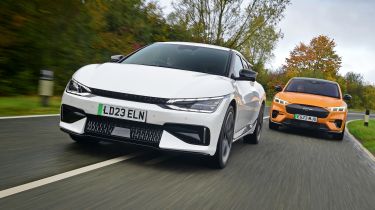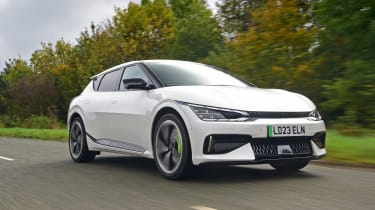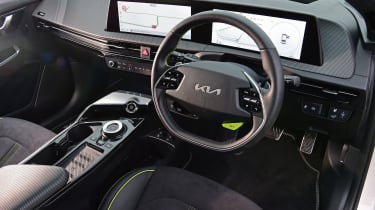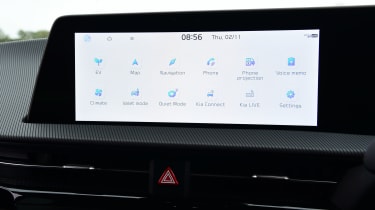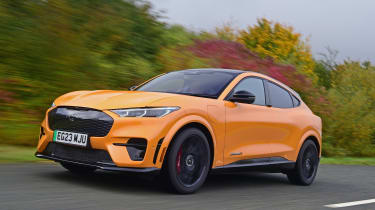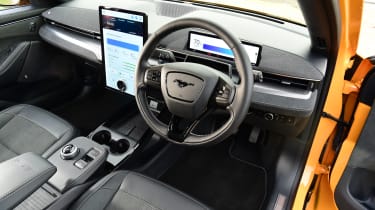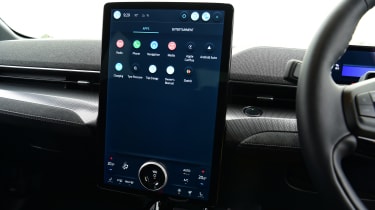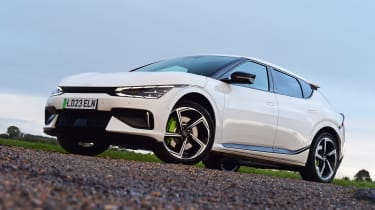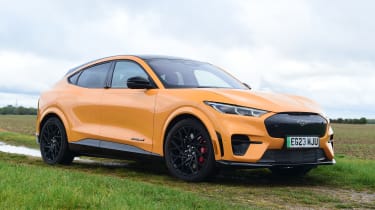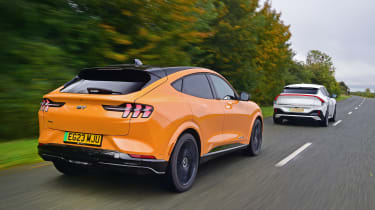Kia EV6 GT vs Ford Mustang Mach-E GT: EV grand tourers go head-to-head
Kia’s EV6 range has a new flagship, the GT. We put it through its paces against the Ford Mustang Mach-E GT
GT: two letters that have sat proudly on the boot lids of some of the finest high-performance cars ever created. Such models deliver a blend of pace, comfort and refinement that makes them as adept at crossing continents as they are at baiting supercars in a straight line. With the world moving rapidly towards an electric future, how will those letters translate?
Kia believes it has the answer with the EV6 GT. The hottest version of the EV6 range gets a series of technical upgrades to make it even more relaxing than the standard car, but more rapid and focused, too.
The grand tourer is no stranger to Ford, especially one wearing the Mustang nameplate. But while previous Mustang GTs used a muscular V8 engine, the Mustang Mach-E GT’s electric powertrain blows away the firm’s current petrol muscle in terms of straight-line performance. So which of these two contenders make the more compelling GT car for the modern age?
|
Kia EV6 GT |
Ford Mustang Mach-E GT | |
|
Price: |
£62,645 |
£67,540 |
|
Powertrain: |
Twin electric motors/lithium-ion battery |
Twin electric motors/lithium-ion battery |
|
0-62mph: |
3.5 seconds |
4.4 seconds |
|
Test efficiency: |
2.5 miles/kWh |
2.8 miles/kWh |
|
Official CO2 |
0g/km |
0g/km |
|
Annual VED: |
£0 |
£0 |
Kia EV6 GT
When it was launched, the £62,645 EV6 GT became the most expensive Kia ever sold in the UK. As we’ll see, there are lots of changes beyond the conventional EV6 that Kia believes are more than enough justification for that hefty figure.
Tech highlights
The Hyundai Group’s E-GMP architecture that underpins the EV6 can accommodate two electric motors. Kia has really maximised that potential here, with the front motor making 215bhp and the rear one 362bhp. Combined, they offer up 577bhp – the same as the new Mercedes-AMG SL63 – and 740Nm of torque. That’s also a hefty 256bhp more than the existing EV6 AWD Dual Motor model.
Used - available now

2022 MINI
5-Door Hatch
28,571 milesAutomaticPetrol2.0L
Cash £19,587
2023 Jaguar
XF
30,114 milesAutomaticPetrol2.0L
Cash £28,950
2021 BMW
iX3
37,202 milesAutomaticElectric
Cash £23,787
2021 BMW
iX3
66,653 milesAutomaticElectric
Cash £20,287Front and rear discs measuring 380mm and 360mm respectively help keep the 2.2-tonne GT’s momentum in check, and the car’s calipers are highlighted with neon paint. Adaptive dampers form part of an uprated suspension system, which also features front springs that are nine per cent softer and rears that are 11 per cent stiffer.
Another key inclusion is an e-LSD. Press the GT button on the steering wheel, and in combination with a relaxed stability control setting, the e-LSD lets the EV6 engage a Drift Mode if you find enough space on a closed race track.
The GT’s battery pack has the same 77.4kWh capacity as other twin-motor EV6s, and the 800-volt electrical architecture allows for rapid charging; enough for a 10-80 per cent recharge in 18 minutes. Based on WLTP figures, the GT is capable of 263 miles between charges, much less than the AWD Dual Motor EV6, which can achieve 300 miles in GT-Line S trim when equipped with 20-inch wheels.
Safety: Euro NCAP tested the EV6 range in 2021 and awarded it a maximum five stars, including a 93 per cent score for Adult Occupant protection.
On the road
The GT’s chassis and powertrain changes have undoubtedly produced a more sophisticated machine. The staggering performance is never in question, but neither is the significant weight.
Around town: There’s an underlying firmness to the EV6’s ride, but also more finesse than in the standard car, which is manifested in less fidgeting at low speeds. However, it’s a large, bulky car, so the Kia isn’t the easiest machine to thread around town. The throttle is very easy to modulate away from a standstill, despite the performance potential when you explore its full travel.
A & B-roads: Up the pace, and the EV6’s character is at the softer end of the GT spectrum. It isn’t agile to drive, instead trading ultimate sharpness for a little body roll and a relaxed (if precise) steering response. The rear-biased powertrain means that it is possible to play with the car’s balance, but it’s quite a hair-raising experience, because you’re very aware of the sheer amount of mass that’s being transferred from side to side and axle to axle.
But there’s no denying the Korean model’s straight-line speed. Engage Sport or GT modes to access the full 577bhp, and the EV6 feels every bit as staggeringly fast as the 3.5-second 0-62mph time suggests. The brakes are more than up to the task of wiping the speed off, however, which is not something we can say with as much confidence about the standard EV6.
Motorway: As a long-distance companion, the GT proves solid and reassuring, although efficiency takes a hit. A real-world range of 194 miles in a mix of driving environments means that it’s not the most suitable car for crossing continents – or even the UK – without some forward planning.
Ownership
Kia has sprinkled some sportiness within the EV6’s cabin to separate the GT from the rest of the range. The biggest change comes with the front seats; the usual EV6 pair are ditched in favour of two sports bucket items, which are as supportive as they are fantastic to look at. They are manually adjustable, though, which seems just a little out of sync with the otherwise luxurious brief and the price point at which the GT is pitched.
The seats feature bright neon stitching, which is also found on the vegan-leather steering wheel and is matched by both the graphics on the digital instruments and the GT button that gives the driver a shortcut to the most extreme drive-mode settings. Elsewhere, it’s the same as the regular EV6, which means the cabin looks modern and feels airy – even if headroom is a little tight for taller occupants. A big start button sits on the centre console, just behind the heated seat and steering-wheel controls.
Being a Kia, the EV6 GT comes with an industry-leading warranty cover period of seven years. This also runs to 100,000 miles. The battery pack is covered for the same period of time – if it drops to less than 70 per cent of its original capacity before the 84-month period is up, then Kia will cover the cost of any repairs or replacements.
The brand chalked up an impressive sixth-placed finish (out of 32) in our 2023 Driver Power satisfaction survey for manufacturers. Buyers particularly like Kia’s interior controls and technology, while the most common gripe for the brand – the jerkiness of its gearboxes – is a not an issue with this fully electric model.
Storage: The two-tier centre console includes a higher level with space for cup-holders and a wireless smartphone charging pad, and a lower level on which larger items can be held. The front door bins are generously sized, too.
Practicality
The EV6 is very spacious overall, if you can live with a few small compromises.
Rear seats: Legroom is simply vast for rear-seat passengers, with the EV6 ranking among the most spacious cars we’ve ever measured. However, much like in the front, headroom in the back is merely average. The wide rear bench and flat floor make it fairly comfortable for a third passenger, as long as they’re not too tall. The Isofix points are a little awkward.
Boot: For a car so large, a 448-litre boot isn’t a brilliant size. While the boot floor covers a huge area, it’s quite shallow, so it won’t be the best vehicle for transporting bulky items. The rear seat bench has a 60:40 split, and leaves only a small step up in the load area when it’s laid flat. There’s also an additional 20-litre storage area under the bonnet, which can hold the car’s charging cable.
What to buy?
Which engine and trim we’d choose
- Powertrain: The GT is the most potent EV6, but with 321bhp, the dual-motor model is hardly slow and it starts from more than £10,000 less. Single-motor EV6s are cheaper still and have a better range. If you can afford the extra cost, the improvements over the rest of the range are tangible, but most buyers would be better off with lesser variants.
- Trim: The GT is only available in a single trim level, but it’s loaded with standard kit. Wheels and brakes aside, the external differences from the rest of the range are subtle; the grille inserts are unique and the rear bumper has a sportier look.
- Our choice: The entry-level Air is the best model in the EV6 family
Ford Mustang Mach-E GT
Ford is currently offering a generous discount on the Mach-E GT, so we’re testing it at its reduced price, although at £67,540, it’s still more expensive than the Kia. It weighs in at £74,540 without the money off.
Tech highlights
It’s not often that a car with 480bhp could be considered a little off the pace, but that figure puts the Mustang Mach-E GT 97bhp down on its rival. However, its dual-motor set-up compensates with a staggering 860Nm of torque, which is 120Nm more than the Kia. At 2,273kg, the Ford’s official kerbweight is also 73kg more than its rival’s, but the Ford packs a battery with a whopping 91kWh usable capacity, 13.6kWh more than the EV6. The result is a 3.7-second 0-62mph time: 0.2 seconds shy of its rival’s, but still not a figure to sniff at.
Chassis upgrades comprise some adaptive dampers that control the movement of 20-inch wheels that are eight inches wide – an inch wider than other Mach-E models – while the 385mm front brake discs are gripped by Brembo calipers.
At 150kW, the maximum charging rate is more than 80kW down on the EV6’s speed, so while you won’t need to recharge as often, you’ll have to wait a few minutes longer on the occasions that you do.
Safety: Like the Kia, the Mustang Mach-E was assessed by Euro NCAP in 2021, and it also chalked up a five-star rating. Dive into the categories, and the Adult Occupant, Child Occupant and Safety Assist scores were each a percentage point or two behind the Kia, and the Vulnerable Road Users score of 69 per cent fell some way short of the EV6’s 80 per cent mark in this evaluation.
On the road
From the point of view of a keen driver, the Mach-E takes a little more adaptation to fully exploit, but once you’re dialled into the Ford’s behaviour, it feels sharper to drive than the EV6.
Around town: It only takes a few yards to realise that all of the controls feel more honed than in than the Kia. That’s not always a good thing, though; the Ford’s brakes in particular are very grabby and the integration with electric-motor regeneration isn’t the best, so coasting and stopping isn’t always the smoothest process. There’s an overriding firmness to the Mustang’s ride that will make it less relaxing to live with than its Korean rival, too.
A & B-roads: Push the Mustang a little harder, and confidence is initially high, thanks to a steering response that is much faster than in the EV6, giving the impression of a more agile chassis.
As with the Kia, most of the power goes to the back wheels, so it’s possible to generate some slip from the rear axle, but you can also light up all four tyres in damp conditions. Yet getting the maximum out of the Mach-E requires you to dial into its rhythm, rather than the other way around.
Despite the Mustang’s firm suspension, there’s a noticeable amount of pitch and dive under braking and acceleration, which means it can start to feel unruly if you’re not very precise with your inputs. Grip is strong, but the Ford is more snappy than the Kia when its limits are reached.
Motorway: Wind noise is very well contained in the Mustang, which means that long-distance cruises are interrupted by only some tyre roar.
Ownership
For a high-performance car costing nearly £70k, the interior design is a little underwhelming. Beyond a vast central touchscreen, there’s very little to catch the eye, and some fabric strips across the dashboard don’t do enough to distract from plenty of cheap-feeling plastics on the areas of the dash and centre console that will be regularly touched in everyday use. Many of these are similar to or shared with Ford’s cheaper models, such as the Puma, and even on a £20,000 compact SUV they aren’t setting any class standards for quality.
The GT gets some sportier seats to set it apart from the base Mach-E models. They have heavy side bolstering that works well for those with taller or wider frames, but shorter drivers won’t gain much benefit. Above those bolsters are a set of fixed headrests, and some testers felt these forced their head further forward than they would ideally like, leading to an uncomfortable driving position that became wearing on longer journeys.
Based on feedback from Ford owners, the ownership experience has the potential to be a little wearing, too. Of the 32 brands surveyed in our 2023 Driver Power satisfaction survey, Ford ranked 28th. While respondents were generally unimpressed with their cars overall, it’s worth noting that 21 per cent of Ford owners who completed the survey experienced faults – that’s a smaller proportion than Kia drivers, a quarter of whom complained of issues. But Ford only offers a three-year warranty with the Mach-E, although the battery pack is protected for eight years.
Storage: There’s no shortage of storage up front, with a cubby beneath the centre armrest that’s a lot deeper than the similar area in the Kia. Grips on the inside of the deep cup-holders can firmly hold a variety of cup and bottle sizes, while a large shelf ahead of that has space for two smartphones. One of those spots doubles as a wireless charging pad.
Practicality
Passenger room inside the Mustang Mach-E is excellent, but boot space is a little disappointing for a car of this size.
Rear space: The distance between the Mustang’s rear bench and the roof is 5mm greater than in the Kia, which will make a difference for taller passengers. While kneeroom can’t match the EV6, the Mach-E still has a huge amount of space to stretch out in the back; only limited footroom under the front seats takes the shine off. Loading a child seat is fiddly, because the Isofix mounts are located behind narrow slits in the upholstery. The Kia’s mounts are easier to reach.
Boot: At 408 litres, the Mach-E’s boot is even smaller than the EV6’s, and the load lip is very high. But the rear seat bench folds completely flat, and the front boot is very deep and spacious, which offsets the lack of space in the rear load bay a little.
What to buy?
Which engine and trim we’d choose
- Powertrain: The Mach-E line-up kicks off from £43,830, although this model features a 72kWh (usable) battery. The long-range version is capable of 372 miles; it has a single motor, 290bhp, and costs £52,830. An all-wheel-drive version gains 56bhp (and loses 31 miles of range) for £6,025 more, but that still significantly undercuts the GT.
- Trim: The single-motor 72kWh model is available only in Select trim. Premium covers the two extended-range models, and adds an excellent B&O sound system, a panoramic sunroof and electric seats, among other features.
- Our choice: We’d go for the RWD Extended Range version of the Mustang Mach-E
Results
Which car comes out on top?
Winner: Kia EV6 GT
Kia has proven that there’s certainly potential for a fully electric car to fill the GT brief. It offers great long- distance comfort while delivering just enough engagement on a twisty road, plus its straight-line performance is not far shy of the latest supercars’. A spacious cabin and slick in-car tech add to the appeal. Only a disappointing real-world range lets the side down, but that aside, the EV6 GT has what it takes to win this contest.
|
Pros |
Cons |
|
Stunning performance |
Weight |
|
Long-distance comfort |
Headroom |
|
Smart in-car tech |
Disappointing range |
|
Seven-year warranty |
Standard EV6 makes more sense |
Runner up: Ford Mustang Mach-E
The appeal of that badge and the glitzy in-car tech will be hard for some people to ignore, but the Mustang can’t quite beat the EV6 in this battle. The range is excellent and the cabin is roomy, but as a driver’s car it doesn’t quite gel in the same way that the Kia does. The ride makes it less pleasant to use from day to day, and it isn’t quite sophisticated enough when driving hard to make up for it. Throw in a high price, plus steep depreciation, and it has to settle for second.
|
Pros |
Cons |
|
Sharp steering |
Grabby brakes |
|
Great range |
Cheap-feeling cabin |
|
Roomy cabin |
Small boot |
|
Straight-line speed |
High price |
Rivals and other options
The Kia EV6 GT wins our twin test but what else is out there?
- Same class: Tesla Model Y Performance
- Same money: BMW i4 M50
- Same money (used): Porsche Taycan
- Same money (used): Jaguar I-Pace
- Coming soon: Alpine GT X-Over
The great debate
What the Auto Express test team would do…
Jordan Katsianis, senior staff writer: “The petrol Mustang’s huge success has been built on the fact that it’s a performance-car bargain. Of the many reasons one could question the sanity of sticking the Mustang name on a two tonne-plus electric SUV, the fact that the Mach-E GT is so expensive is right up there.”
John Mcllroy, editor-at-large: “Kia is really on a roll at the moment, with new-car launches seemingly breaking by the month. While the EV6 GT was the brand’s most expensive model at launch, that has all changed with the debut of the EV9. The all-electric seven (or six) seat SUV costs as much as £76,995.”
Steve Fowler, editor-in-chief: “The EV6 doesn’t just face stiff competition from the US, but also much closer to home. Parent group Hyundai’s Ioniq 5 N has put its own stamp on the high-performance EV segment, and with 641bhp, it’s even more potent than the Kia. Extensive engineering work has made it huge fun to drive, too.”
Richard Ingram, deputy editor: “One thing that this test proves is that high performance is very easy to extract from an electric motor. To give an electric car a distinctive character, it’ll become ever-more important that the rest of the driving experience stands out from the crowd; we’re excited to see what the future brings.”
Dean Gibson, senior test editor: “After a long pause while the Mach-E has been the only EV Ford has produced, that will change soon. We’ve already seen the F-150 Lightning in America, but an electric Puma, plus a family SUV Explorer and its rakish Capri stablemate will soon bolster the line-up.”
Which would you buy? Let us know in the comments section below…
Specs and prices
|
Kia EV6 GT |
Ford Mustang Mach-E GT | |
|
On the road price/total as tested |
£62,645 / £ 64,145 |
£67,540 / £69,090 |
|
Residual value (after 3yrs/36,000) |
£ 34,849 / 55.6% |
£30,050 / 44.49% |
|
Depreciation |
£27,796 |
£37,490 |
|
Annual tax liability std/higher rate |
£250.36 / £ 500.70 |
£298 / £595.90 |
|
Annual elec. cost (10k/20k miles) |
£1,296 / £ 2,160 |
£1,157 / £1,929 |
|
Ins. group/quote/VED |
45 / £1,713/ £0 |
47 / £3,424 / £0 |
|
Service costs (3 years) |
£419 |
£0 |
|
Length/wheelbase |
4,680 / 2,900mm |
4,743 / 2,972mm |
|
Height/width |
1,545 / 1,880mm |
1,613 / 1,881mm |
|
Powertrain |
Single electric motor / lithium-ion battery |
Twin electric motors / lithium-ion battery |
|
Peak power |
577 bhp |
480 bhp |
|
Peak torque |
740 Nm |
860 Nm |
|
Transmission |
Single-speed / 4wd |
Single-speed / 4wd |
|
Battery capacity / useable |
77.4kWh / 77.4kWh |
98 kWh / 91 kWh |
|
Boot capacity (front/seats up/down) |
20 / 448 / 1,097 litres |
81/402 / 1,420 litres |
|
Kerbweight / payload / towing weight |
2,200 / 1,800kg |
2,273kg / 750kg |
|
Turning circle |
11.6 metres |
12.1 metres |
|
Basic warranty/recovery |
7 yrs (100,000) / 1 yr |
3 yrs (60,000) / 1 yr |
|
Driver Power manufacturer position |
6th |
28th |
|
Euro NCAP: Adult / child / ped. / assist / stars |
93 / 89 / 80 / 83 / 5 (2021) |
92 / 86 / 69 / 82 / 5 (2021) |
|
0-62mph / top speed |
3.5 secs / 162mph |
4.4 secs / 124mph |
|
Test economy / range |
2.5 / 194 miles |
2.8 / 255 miles |
|
Claimed range (WLTP) |
263 miles |
304 miles |
|
Charging capability |
7.4 / 233kW |
7.4 / 150kW |
|
Charge time |
12hrs 30mins / 18mins 10-80% |
14hrs / 45 mins 10-80% |
|
Actual/claimed CO2/tax bracket |
0 / 0g/km / 2% |
0 / 0g/km / 2% |
|
Number of airbags / Isofix points |
Seven / two |
Nine / two |
|
Parking sensors/camera |
F&r / 360 |
F&r / yes |
|
Lane-keep assist / blindspot / AEB |
Yes / yes / yes |
Yes / yes / yes |
|
Climate control/adaptive cruise ctrl |
Yes / yes |
Yes / yes |
|
Leather / heated seats / wheel |
No / yes |
No / yes |
|
Metallic paint/LED lights |
£675 / yes |
£1,150 / yes |
|
Keyless entry & go/powered tailgate |
Yes / yes |
Yes / yes |
|
Sat-nav/digital dashboard/USBs |
Yes / yes / four |
Yes / yes / four |
|
Online services/wireless charging |
Yes / yes |
Yes / yes |
|
Apple CarPlay/Android Auto |
Yes / yes |
Yes / yes |

